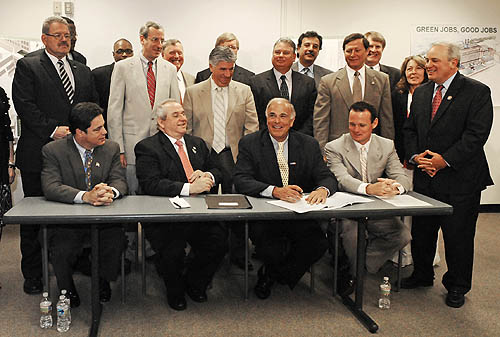
Hill Innovation Center Gets State Funds

Surrounded by members of the Urban Redevelopment Committe and the Pittsburgh Gateways Corporation, Gov. Ed Rendell signs the economic development portion of the 2010-11 state budget to help create jobs.
Gov. Ed Rendell on Wednesday announced up to $8 million in state funding for a green innovation center in the Lower Hill District that may begin operations by fall.
Pittsburgh Green Innovators — to be housed in the former Connelley vocational-technical school — will be a home for new companies and training programs with an environmental theme.
In a sign of the project’s importance, Mr. Rendell traveled to the location to announce the funding for that project and sign the legislation creating the $600 million development fund, called the Redevelopment Assistance Capital Program.
“Pittsburgh has probably transformed itself more than any other American city, and that transformation is ongoing. It doesn’t stop. Green energy is the way of the future,” he said.
In all, about $300 million of the money already has been earmarked for projects statewide.
That includes the $8 million for Pittsburgh Green Innovators and up to $30 million to lure a federal vaccine production center to Allegheny County. The center, proposed by the University of Pittsburgh Medical Center, would produce vaccines needed to defend against biological attacks.
Recipients of the state money must match it dollar-for-dollar with funds from other sources.
Pittsburgh Gateways, a Lawrenceville economic-development group that’s spearheading the green innovation center, is negotiating with Pittsburgh Public Schools to acquire the 300,0000-square-foot former Connelley building. Robert Meeder, president of Pittsburgh Gateways, said he hopes to close on the deal as early as September.
He said the first phase of renovations — focusing on 80,000 square feet but including the installation of environmentally friendly energy systems throughout the building — could begin in the first half of 2011. He said that work will cost about $26 million, while a later phase of renovations, covering the rest of the building, would cost an estimated $19 million more.
Officials have said public school classes, apprenticeship programs and college classes all would be offered at the center, allowing students to train for careers with an environmental focus.
In a sense, the building — employing solar, geothermal and other alternative energies — will be a giant classroom, Dr. Meeder said.
The first classes may begin in the fall, he said.
The building also will serve as an incubator for start-up businesses. Dr. Meeder said as many as 14 fledging companies may have space there by the end of 2011.
State Sen. Jim Ferlo, D-Highland Park, an early proponent of the project, said the center already received $4 million from a previous pot of Redevelopment Assistance Capital Program dollars. The project also has received about $2 million in federal aid, and Dr. Meeder hopes to lure $7 million from corporate and foundation sponsors.
